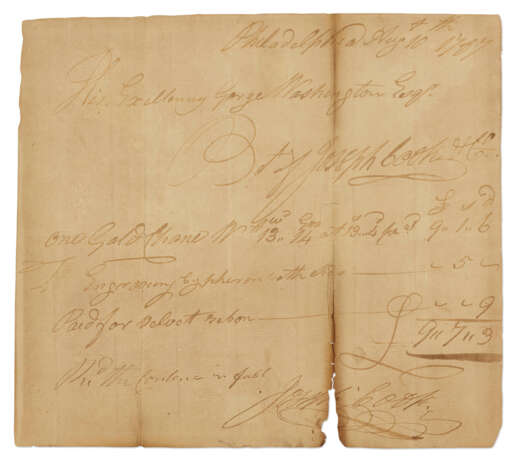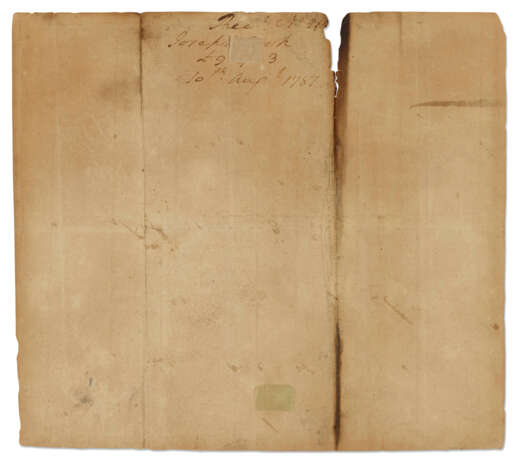ID 887936
Lot 158 | Purchasing a gold watch chain with a "cypher"
Estimate value
$ 4 000 – 6 000
One page, 182 x 205mm (partial separation along toned vertical crease, moderately toned overall).
During his attendance at the Constitutional Convention, Washington orders a gold watch chain with an engraved "Cypher" on the reverse from a Philadelphia jeweler who at one time aspired to be "silver Smith to the President." Philadelphia jeweler Joseph Cook invoices Washington, then serving as President of the Constitutional Convention meeting in Philadelphia since May of 1787. The bill includes £9-1-6 for "one Gold Chane," 5 shillings for "Engraving Cypher on other Sides," as well as 9 pence for "velvet rebon." On the verso of the invoice, Washington added a docket for filing: "Rect Joseph Cook £9 7 3 10th Augt 1787." Washington's pocket book of daily expenses from the Constitutional Convention records a payment to Joseph Cook a week later on 18 August: "By Cash pd … for gold Watch C[h]a[in] } 9-7-3." (Papers, Confed. Ser., Philadelphia Cash Accounts, 5:176)
The jeweler Joshua Cook [sometimes spelled “Cooke”] (d. 1802) began advertising his services in Philadelphia in 1785 and claiming a decade of experience in his trade in London before emigrating to America. In addition to this transaction, Washington transacted nearly another £40 in with Cooke during the summer of 1787 alone. (Ibid) When the federal government moved to Philadelphia in 1790, Cook may have become a bit too enthusiastic about his business relationship with Washington. In December 1790 Tobias Lear wrote to Cook on the president’s behalf that it had "been intimated to the President of the United States that you are about to have his arms fixed over your shop, with the addition of your being silver Smith to the President." Lear made it clear that this prospect was "very disagreeable" to Washington, who requested, politely but firmly, he "would not do it." It appears that Cook complied, and he continued to do business with Washington until at least 1793. By 1795, Cook, a tireless self-promoter posting regular, and lengthy, advertisements in the Philadelphia papers, had fallen on hard times and he formulated an elaborate "lottery scheme," ostensibly to benefit the "improvement of the Federal City," but in reality, it may have been only a means for Cooke to liquidate his property and move himself to Washington, which he did sometime between 1796 and 1797. There, he attempted to continue in his trade, additionally offering his services overseeing building projects and as a real estate agent, but with little apparent luck. On Christmas Day, 1797, he wrote to Washington that he was that he was unable to secure a living—seeking employment from the government or Washington's family. (JC to GW, 25 Dec. 1797, Papers, Retirement Ser., 1:531)
| Artist: | George Washington (1732 - 1799) |
|---|---|
| Place of origin: | USA |
| Auction house category: | Letters, documents and manuscripts |
| Artist: | George Washington (1732 - 1799) |
|---|---|
| Place of origin: | USA |
| Auction house category: | Letters, documents and manuscripts |
| Address of auction |
CHRISTIE'S 8 King Street, St. James's SW1Y 6QT London United Kingdom | |
|---|---|---|
| Preview |
| |
| Phone | +44 (0)20 7839 9060 | |
| Buyer Premium | see on Website | |
| Conditions of purchase | Conditions of purchase |












